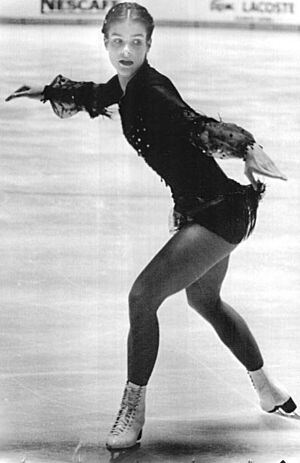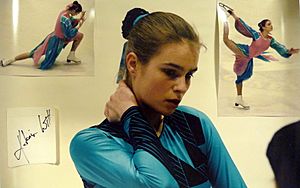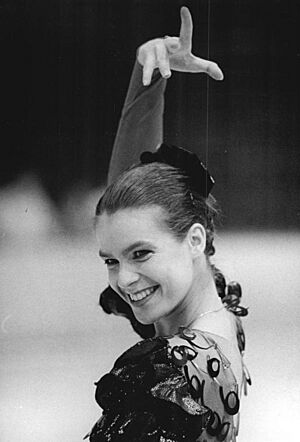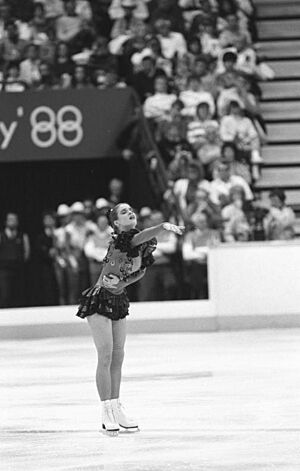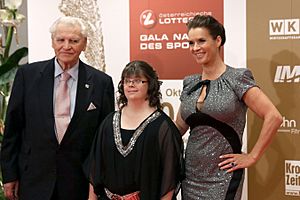Katarina Witt facts for kids
Quick facts for kids Katarina Witt |
||||||||||||||||||||||||||||||||||||||||||||||||||||||||||||||
|---|---|---|---|---|---|---|---|---|---|---|---|---|---|---|---|---|---|---|---|---|---|---|---|---|---|---|---|---|---|---|---|---|---|---|---|---|---|---|---|---|---|---|---|---|---|---|---|---|---|---|---|---|---|---|---|---|---|---|---|---|---|---|
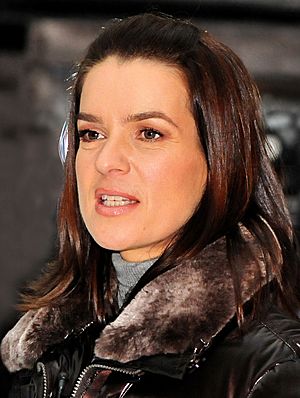
Witt in 2010
|
||||||||||||||||||||||||||||||||||||||||||||||||||||||||||||||
| Personal information | ||||||||||||||||||||||||||||||||||||||||||||||||||||||||||||||
| Country represented | ||||||||||||||||||||||||||||||||||||||||||||||||||||||||||||||
| Born | 3 December 1965 Falkensee, East Germany |
|||||||||||||||||||||||||||||||||||||||||||||||||||||||||||||
| Height | 1.65 m | |||||||||||||||||||||||||||||||||||||||||||||||||||||||||||||
| Former coach | Jutta Müller | |||||||||||||||||||||||||||||||||||||||||||||||||||||||||||||
| Skating club | SC Karl-Marx-Stadt | |||||||||||||||||||||||||||||||||||||||||||||||||||||||||||||
| Retired | 1988 and 1994 (amateur) 2008 (professional) | |||||||||||||||||||||||||||||||||||||||||||||||||||||||||||||
|
Medal record
|
||||||||||||||||||||||||||||||||||||||||||||||||||||||||||||||
Katarina Witt, born on December 3, 1965, is a famous German figure skater. Many people think she is one of the best female figure skaters ever. She won two Olympic gold medals. People remember her for her amazing athletic skills, her charming personality, and her beautiful style on the ice.
Witt won her first Olympic gold medal for East Germany at the 1984 Sarajevo Olympics. She then won a second gold medal at the 1988 Calgary Olympics. She is one of only two female skaters to win two Olympic titles in a row. The other skater was Sonja Henie from Norway. Witt also won the World Championships four times (1984, 1985, 1987, 1988). She won six European Championships in a row from 1983 to 1988. This was also a record for female skaters, shared with Sonja Henie. Between 1984 and 1988, Katarina Witt won ten gold medals in eleven big international events. This makes her one of the most successful figure skaters ever.
After winning her second Olympic title in 1988, Witt stopped competing as an amateur. She returned for the 1994 Winter Olympics to represent a united Germany. Her performance earned her the Goldene Kamera award. After retiring from skating, Witt has worked in movies and television.
Contents
Katarina Witt's Early Life
Witt was born in Staaken, which was part of East Germany at the time. It was near West Berlin and is now part of Berlin. Her mother worked as a physiotherapist in a hospital. Her father was a farmer. Katarina went to school in Karl-Marx-Stadt, which is now called Chemnitz again. She attended a special school there for children who were very good at sports.
Katarina Witt's Competitive Skating Career
Katarina Witt skated for the SC Karl-Marx-Stadt club in East Germany. Her coach, Jutta Müller, started training her in 1977. Witt trained six days a week, sometimes for seven hours a day. Three of those hours were spent on compulsory figures, which are special patterns skaters draw on the ice.
Witt first competed in a big international event at the 1979 European Figure Skating Championships, where she finished 14th. In 1982, she won her first major medals, taking silver at both the European and World Championships. She almost won the 1982 World Championships but made some mistakes on her jumps. The next year, she won her first European title. However, she finished fourth at the World Championships because of her low scores in compulsory figures.
In 1984, Witt was named "GDR Female Athlete of the Year." She won the 1984 Olympic title in Sarajevo. She beat Rosalynn Sumners from the United States. Witt landed three triple jumps in her free skate. The judges scored her just enough to win the gold medal. Witt was 18 years old when she won her first Olympic gold. After the Olympics, she won her first World title easily. She won all three parts of the competition.
Witt won her World title again in 1985. She skated very well in all parts of the competition. She was challenged by Kira Ivanova and Tiffany Chin. Witt performed a program with four triple jumps and showed great artistry. She won the long program and the overall gold medal.
In 1986, Witt lost her World title to Debi Thomas from the United States. Witt won the long program at those World Championships. However, a mistake in her short program meant she finished second overall. This loss made Witt determined to win her title back and compete in the 1988 Calgary Olympics.
In 1987, Witt won her third World title. She was fifth in the compulsory figures. But other top skaters also made mistakes. Witt landed five triple jumps in her free skate, including a difficult triple loop. She earned the best scores for both technical and artistic parts of her performance. She won her World title back in front of an excited crowd.
In 1988, Witt won her sixth European Championship in a row. This matched Sonja Henie's record for the most consecutive European titles. While Irina Slutskaya has since won more European titles overall, Witt still holds the record for most consecutive wins with Henie.
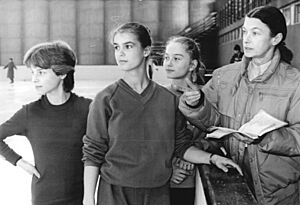
Both Witt and Debi Thomas were top favorites at the 1988 Winter Olympics in Calgary, Canada. Their competition was called the "Battle of the Carmens" because both skated their long programs to music from the opera Carmen. Witt and Thomas were in the top two spots after the first two parts of the competition. In her long program, Witt landed four triple jumps. She changed a planned triple loop to a double loop. This left a chance for Thomas to win, but Thomas missed three of her planned triple jumps. Elizabeth Manley from Canada won the long program. However, Witt kept her Olympic title based on her overall scores. Witt became only the second woman to win two Olympic figure skating titles in a row. After her win, North Korea even released stamps with pictures of Witt on the ice. Time magazine called her "the most beautiful face of socialism."
Witt won her fourth and final World title in 1988 in Budapest, Hungary. This ended her amateur skating career. She won the gold medal by winning the compulsory figures and the long program.
Post-Skating Career and Comeback
In 1988, Katarina Witt began a professional skating career. This was unusual for athletes from East Germany at the time. She toured the United States for three years with Brian Boitano, another Olympic champion. Their show was very popular. She also acted in the film Carmen on Ice (1989), which was based on her Olympic free program. In 1990, she won an Emmy Award for her role in this film.
In 1994, Witt returned to competitive skating. She was coached again by Jutta Müller. She finished second at the German Championships. Her first international competition for a united Germany was the 1994 European Figure Skating Championships, where she finished eighth. She then competed at the 1994 Winter Olympics in Lillehammer, Norway, where she finished seventh. Her free program was skated to the song "Where Have All the Flowers Gone?" and included a message of peace for the people of Sarajevo. She received the Golden Camera award for her Olympic comeback.
Witt's skating costumes sometimes caused discussion. At the 1983 European Figure Skating Championships, she wore knee breeches instead of a skirt. Her blue, skirtless costume from 1988 was seen as too theatrical. This led to a new rule, sometimes called the "Katarina rule," which required female skaters to wear more modest clothing. In 1994, when she skated a Robin Hood-themed program, she said she wore a man's costume so she wouldn't be accused of trying to impress the judges with her outfit.
In 1994, Witt published her autobiography, Meine Jahre zwischen Pflicht und Kür (My Years between Compulsories and Freestyle). In 1995, Witt was added to the World Figure Skating Hall of Fame. She had her farewell tour from show skating in 2008.
Life After Skating
In 1996, Witt received the Golden Plate Award from the American Academy of Achievement. She also had small roles in the movie Jerry Maguire and on the TV show Everybody Loves Raymond. She starred in a German film called Die Eisprinzessin (The Ice Princess).
Witt appeared in the film Ronin in 1998. In November 2005, Witt published a novel called Only with Passion. This book gives advice to a young skater, based on Witt's own experiences. From 2006, she had her own TV show in Germany called Stars auf Eis ("Stars on Ice"). In 2012, Witt became a judge on the UK TV show Dancing on Ice.
In 2013, Witt appeared in her first main role on German TV. She played a figure skater who was being followed by a stalker. This TV movie, The Stalker, had parts that were like Witt's own life, as she had been stalked years before.
East German Files
After East Germany was no longer a country, secret police files were found. These files showed that the secret police, called the Stasi, tried to keep Witt from leaving the country. They gave her cars and places to live, and allowed her to travel to other countries. Witt found 3,500 pages of files about her life, starting from when she was seven years old.
Skating Programs
| Season | Short program | Free skating | Exhibition |
|---|---|---|---|
| 1993–1994 |
|
|
|
| 1987–1988 |
|
|
|
| 1986–1987 |
|
||
| 1985–1986 |
|
|
|
| 1984–1985 |
|
|
|
| 1983–1984 |
|
|
|
| 1982–1983 |
|
|
|
| 1981–1982 | |||
| 1980–1981 |
Competition Results
| Event | 1978–79 | 1979–80 | 1980–81 | 1981–82 | 1982–83 | 1983–84 | 1984–85 | 1985–86 | 1986–87 | 1987–88 | 1993–94 |
|---|---|---|---|---|---|---|---|---|---|---|---|
| Olympics | 1st | 1st | 7th | ||||||||
| Worlds | 10th | 5th | 2nd | 4th | 1st | 1st | 2nd | 1st | 1st | ||
| Europeans | 14th | 13th | 5th | 2nd | 1st | 1st | 1st | 1st | 1st | 1st | 8th |
| Skate Canada | 1st | ||||||||||
| NHK Trophy | 2nd | 1st | 1st | 1st | |||||||
| Blue Swords | 1st | 2nd | 1st | ||||||||
| International Challenge Cup | 2nd | 1st | 1st | ||||||||
| Golden Spin of Zagreb | 3rd | ||||||||||
| East German | 3rd | 2nd | 1st | 1st | 1st | 1st | 1st | 1st | 1st | 1st | |
| German | 2nd |
See also
 In Spanish: Katarina Witt para niños
In Spanish: Katarina Witt para niños
- Sport in Berlin
External links
- Katarina Witt at Olympics.com (archived: OlympicChannel.com and Olympic.org)
- Katarina Witt at OlympediaLua error in Module:EditAtWikidata at line 29: attempt to index field 'wikibase' (a nil value).
| Awards and achievements | ||
|---|---|---|
| Preceded by |
East German Sportswoman of the Year 1984 |
Succeeded by |
 | Audre Lorde |
 | John Berry Meachum |
 | Ferdinand Lee Barnett |


